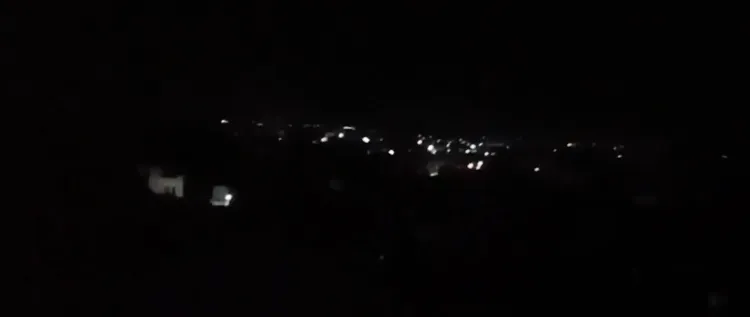How Did Pakistan's Aerial Strikes Against India Fail?

Synopsis
Key Takeaways
- India's air defence systems successfully neutralized Pakistan's aerial attacks.
- No damage or casualties were reported during the attempted strikes.
- Emergency protocols were activated, including blackouts and sirens across several regions.
- Retaliatory actions were undertaken by India against Pakistani military assets.
- International diplomatic efforts are in progress to de-escalate tensions.
New Delhi, May 9 (NationPress) India's air defence systems successfully thwarted aerial assaults launched by Pakistan, aimed at Jammu and various military installations near the western frontier on Thursday night. The armed forces confirmed that no damage occurred during these attempts.
The offensive, which included both drones and missiles, resulted in blackouts and sirens being activated across numerous regions in Jammu & Kashmir, Punjab, and Rajasthan. Local authorities advised residents to stay indoors and alert as emergency measures were put in place. The Indian Premier League 2025 match featuring Punjab Kings and Delhi Capitals at the HPCA Stadium in Dharamshala was interrupted as a precaution.
The Integrated Defence Staff reported that military stations, including those in Jammu and Udhampur, suffered no losses.
"Military Stations of Jammu, Pathankot and Udhampur near the International Boundary in Jammu & Kashmir were targeted by Pakistan using missiles and drones. Threat neutralized by #IndianArmedForces through both kinetic and non-kinetic measures," stated the IDS in a post on X.
Sources mentioned that Indian air defenses intercepted multiple drones near Jammu airport, with no casualties reported.
Additionally, eight missiles were intercepted close to Jammu, all successfully destroyed, as per media reports. The incident also caused temporary power outages at the Vaishno Devi shrine in Reasi district and in Srinagar amid heightened security.
Union Home Minister Amit Shah has reached out to the Directors General of border forces to evaluate the situation at the borders. He has also consulted with the CISF Director General regarding airport security.
Furthermore, the Home Minister held discussions with Jammu & Kashmir Lt Governor Manoj Sinha and Director General of Police Nalin Prabhat.
In response to the attacks, India has reportedly launched retaliatory measures against Pakistan.
An F-16 supersonic fighter jet belonging to the Pakistan Air Force was shot down in the evening by an Indian surface-to-air missile defense system, according to NDTV sources.
The F-16, which took off from the Sargodha airbase, was brought down in its vicinity, the reports indicated.
External Affairs Minister S. Jaishankar engaged in discussions with counterparts from several nations, including the United States, late Thursday, reaffirming India's determination to counter any escalatory actions from Pakistan.
Meanwhile, UN Secretary-General Antonio Guterres has advocated for de-escalation of the India-Pakistan conflict, as reported by his Deputy Spokesperson Farhan Haq.
"We certainly support all efforts to de-escalate the situation and urge both India and Pakistan to exercise utmost restraint," Haq stated.
International diplomatic initiatives are underway to reduce tensions, with US Secretary of State Marco Rubio communicating with Pakistan Prime Minister Shahbaz Sharif and India's External Affairs Minister S. Jaishankar. Additionally, Iran's Foreign Minister Abbas Araqchi and Saudi Arabia’s Minister of State for Foreign Affairs Adel al-Jubeir were visiting New Delhi for diplomatic discussions.
Haq emphasized: "The world cannot afford another conflict between India and Pakistan, and he (Guterres) has offered his good offices" to aid in de-escalating tensions.
This offensive by Pakistan occurred mere hours after its prior attempt to target 15 Indian cities was thwarted.
Army officer Colonel Sofiya Qureshi and Air Force Wing Commander Vyomika Singh confirmed that cities such as Awantipora, Srinagar, Jammu, Pathankot, Amritsar, Kapurthala, Jalandhar, Ludhiana, Adampur, Bathinda, Chandigarh, Nal, Phalodi, Uttarlai, and Bhuj were on the target list. However, India’s comprehensive counter-UAS grid and effective air defense systems successfully neutralized all threats. Debris retrieved from various locations confirmed that the drones and missiles originated from Pakistani territory.
In a prompt retaliatory action, Indian armed forces targeted and dismantled several Pakistani air defense systems, including a significant installation in Lahore. Concurrently, Pakistan's military initiated unprovoked shelling in the Kupwara, Baramulla, Uri, Poonch, Mendhar, and Rajouri sectors of Jammu & Kashmir, employing heavy artillery and mortars. This aggression resulted in the tragic deaths of 16 civilians, including five children and three women. The Indian Army responded firmly and proportionately.
Previously, India executed precision airstrikes under Operation Sindoor on nine terrorist camps in Pakistan and Pakistan-occupied Kashmir, reportedly neutralizing around 100 militants.










